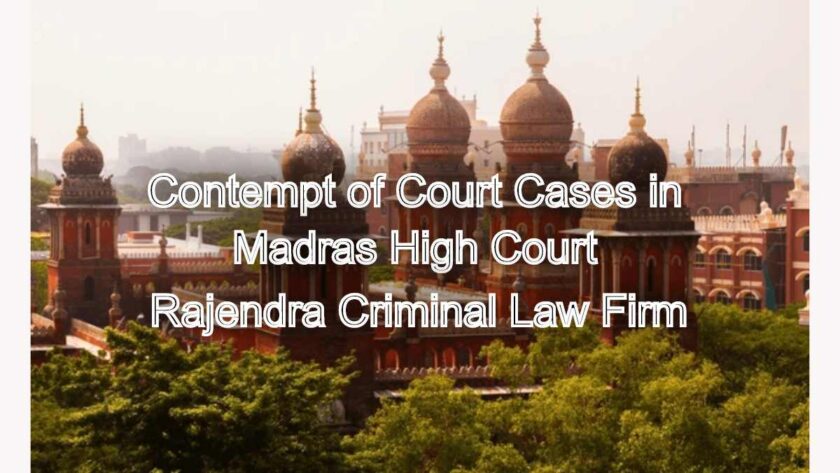Contempt of Court Cases – As Rajendra Criminal Law Firm, we often deal with serious legal matters. One such issue is contempt of court. This is a grave offense. It strikes at the very heart of the justice system. Therefore, the Madras High Court takes it very seriously. Contempt of court is an act of disrespect towards the dignity and authority of a court. It can happen in many ways. It is regulated by the Contempt of Courts Act, 1971. This law gives the High Court the power to punish those who commit contempt. We will now explore the entire process.
What Is Contempt of Court?
First, we need to understand what contempt of court is. The law divides it into two main categories. The first is civil contempt. This type involves willful disobedience. It occurs when a person deliberately disobeys a court’s order. This could be a judgment, a decree, or a direction. It also includes the willful breach of an undertaking given to the court. For example, a person might fail to pay maintenance as ordered by the court. Another example is a company that does not comply with a court injunction. The second category is criminal contempt.
This type is more serious. It involves actions that undermine the authority of the court itself. This includes publishing material that scandalizes the court. It also includes interfering with judicial proceedings. Finally, it involves any act that obstructs the administration of justice. For instance, a person might spread baseless rumors about a judge. This act lowers the court’s authority. Likewise, a person might try to influence a witness. This interferes with the due course of justice.
The Power of the Madras High Court
The Madras High Court holds significant power to handle contempt cases. This authority comes from the Constitution of India. Article 215 states that every High Court shall be a court of record. This means it has all the powers of such a court. Consequently, it can punish for contempt of itself. This power is also enshrined in the Contempt of Courts Act, 1971. The Act specifies the High Court’s jurisdiction. It can punish for contempt of itself. Moreover, it can also punish for contempt of courts subordinate to it. These include all civil and criminal courts in Tamil Nadu. The High Court, therefore, acts as a guardian of the entire judicial system.
The Process of Filing a Case
The process for filing a contempt case in the Madras High Court is formal. It must follow specific rules. The Contempt of Court Rules, High Court, Madras, 1975, govern this process. First, the person alleging contempt must file a petition. This petition must be supported by an affidavit. The affidavit must detail the alleged contempt. It must include all relevant documents. In cases of criminal contempt, there is an additional step. The Advocate General of Tamil Nadu must give his consent.
This requirement ensures that criminal contempt proceedings are not initiated lightly. Similarly, if the court itself decides to initiate a criminal contempt case, it can do so. This is called a suo motu action. All applications are first received by the Registry. The Registry scrutinizes the documents. After that, the petition is presented before a Division Bench. This is a bench of two judges. The bench will then decide whether to issue a notice. The notice requires the alleged contemnor to appear.
Responding to a Contempt Notice
When a person receives a contempt notice, they must act quickly. This is a very serious matter. The notice requires them to appear before the court on a specified date. It also requires them to file a response. The person, known as the contemnor, must explain their conduct. They must also present their defense. They may offer an apology. An apology is a powerful tool in contempt proceedings. The court may choose to accept a sincere apology. A bona fide apology can lead to the discharge of the contemnor. However, a qualified or insincere apology may be rejected. It is therefore crucial to seek expert legal counsel. A lawyer can help draft the response. They can also advise on the best course of action.
The Hearing and Verdict
The contempt case then proceeds to a full hearing. The Division Bench will hear arguments from both sides. The person who filed the petition presents their case. The contemnor presents their defense. The court examines the evidence. It determines whether the alleged act constitutes contempt. A key legal principle is that contempt proceedings are quasi-criminal in nature. The burden of proof is high. The court must be convinced of the contemnor’s guilt beyond a reasonable doubt. If the court finds the person guilty, it passes a conviction order. Subsequently, it moves on to the punishment phase.
Punishments for Contempt
The Contempt of Courts Act, 1971, specifies the punishments. The punishment for contempt can be a simple imprisonment. The term can extend up to six months. It can also be a fine. The fine can extend up to two thousand rupees. The court can also impose both imprisonment and a fine. However, a crucial provision exists. If the contemnor apologizes to the satisfaction of the court, they may be discharged. Furthermore, if the court finds a person guilty of civil contempt, it may direct their detention until they comply with the original order. This is a powerful tool to ensure compliance. The court’s primary objective is to uphold the majesty of law. The punishment is not for the judge’s personal satisfaction. It is to enforce the rule of law.
The Appellate Process
A person convicted of contempt has the right to appeal. The appeal is filed before a Division Bench of the High Court. If the original order was passed by a single judge, the appeal goes to a Division Bench. A further appeal can be made to the Supreme Court of India. This appeal is based on Section 19 of the Act. The entire appellate process is designed to ensure fairness. It allows the contemnor to challenge the conviction and the sentence.
Frequently Asked Questions
Civil contempt is when someone willfully disobeys a court order, like ignoring a judgment to pay a debt. 🧑⚖️ Criminal contempt is more serious; it involves actions that undermine the court’s authority, such as scandalizing a judge or interfering with judicial proceedings.
A contempt case can be initiated in a few ways. An aggrieved party can file a petition in the court. For criminal contempt, the Advocate General of Tamil Nadu must give consent for the case to proceed. The court can also take suo motu (on its own motion) cognizance of contempt, especially if it happens in front of them or is a matter of public concern. 📜
Under the Contempt of Courts Act, 1971, the maximum punishment is simple imprisonment for up to six months, a fine up to two thousand rupees, or both. However, the court can also choose to discharge the contemnor if they offer a sincere apology that satisfies the court.
Yes, a person convicted of contempt has the right to appeal. The appeal is made to a Division Bench of the Madras High Court if the conviction was by a single judge. A further appeal can be filed with the Supreme Court of India under Section 19 of the Act.
The Advocate General of Tamil Nadu’s role is crucial, particularly in criminal contempt cases. By law, their consent is required before a private person can initiate criminal contempt proceedings.
Conclusion: Upholding Justice
In conclusion, contempt of court is a critical legal concept. It protects the integrity of the judiciary. The Madras High Court has well-defined powers and a clear process to handle these cases. It serves as a deterrent against disrespectful behavior. It also ensures compliance with court orders. At Rajendra Criminal Law Firm, we understand the gravity of contempt cases. We provide expert legal representation to our clients. We help them navigate the complex legal landscape. Our goal is to protect their rights while respecting the legal system. We firmly believe that a strong and respected judiciary is the bedrock of a democratic society.
Read More
- Recent Criminal Appeals Allowed by the Madras High Court – 2025 Review
- Anticipatory Bail in Tamil Nadu: Strategies That Work in Madras High Court
- How to Quash a False FIR Under Section 482 CrPC in Madras High Court
- Landmark Judgments of Supreme Court in Criminal Law (2024–2025)
- Can You Approach the Supreme Court Directly for Fundamental Rights Violation?
- Madras High Court Official Website:





